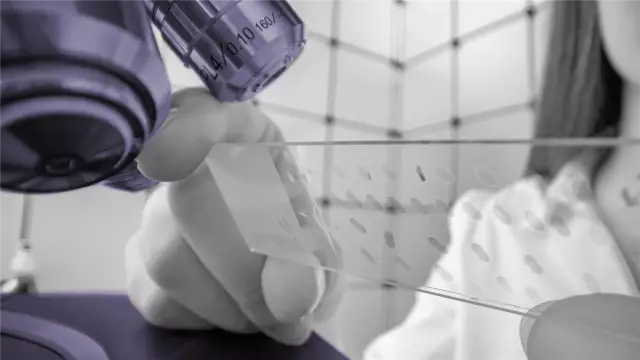- Author Rachel Wainwright wainwright@abchealthonline.com.
- Public 2023-12-15 07:39.
- Last modified 2025-11-02 20:14.
How to avoid cystitis: 7 rules of conduct for women
Cystitis, or inflammation of the lining of the bladder, is a very common condition. Women, due to the peculiarities of the structure of the organs of the genitourinary system, suffer from it about four times more often than men. The main risk group includes the fair sex aged 20 to 45 years. Cystitis is an ailment of bacterial origin, it can have an acute or chronic course. The second option is dangerous not only by frequent relapses, seriously reducing the quality of life, but also by the development of severe pathologies of the kidneys and urinary tract.
Symptoms of cystitis are difficult to confuse with something: in women, it is accompanied by severe pain at the beginning and end of urination, pain in the pubic area and in the perineum, frequent urge to urinate (especially at night), fever, deterioration of the general condition. The urine becomes cloudy, pus and traces of blood appear in it. With a timely visit to a specialist, a woman is successfully cured, but with a weakening of immunity, the disease can give relapses and extremely unpleasant complications.
No one is safe from such a disease as cystitis, but the risk of its development can be minimized.
Personal hygiene comes first
About 80% of cases of cystitis occur due to the penetration of E. coli into the urethra, and then into the bladder (the remaining 20% are staphylococcus, Pseudomonas aeruginosa and other bacteria). The female body is designed in such a way that the outlet of the urethra is located near the entrance to the vagina and the anus. Therefore, the probability of getting pathogenic microflora from the rectum or genital tract into the urethra is high. In addition, the urethra, which is wide and short, is an easy route for pathogenic bacteria to enter the bladder.
The degree of safety in this case directly depends on how correctly, regularly and thoroughly the woman performs the toilet of the external genital organs and the perineal area. Be sure to wash from front to back. It is better to use for this a special soap for intimate areas, which has an antibacterial effect, a solution of potassium permanganate or decoctions of medicinal herbs (calendula, chamomile, sweet clover, etc.), which have an antiseptic effect.
Separately, it should be said about underwear, the wearing of which can provoke the development of cystitis. These are thong panties (their thin bridge facilitates the entry of bacteria from the anus into the urethra), as well as too tight panties made of synthetic materials. When used, a greenhouse effect is created that favors the reproduction of pathogenic microorganisms.

Source: depositphotos.com
Eliminate the possibility of hypothermia
A significant proportion of primary attacks of cystitis is provoked by hypothermia - not without reason this ailment is sometimes called a cold of the bladder. It is enough for a woman to sit on a cold bench, a stone parapet or a damp spring ground that has not had time to warm up, and unpleasant symptoms are guaranteed. Young women of fashion also run the risk of chilling, sporting short skirts and thin tights at the height of winter. This behavior is extremely irresponsible and dangerous: the consequences may not be limited to cystitis. If the inflammatory process in the organs of the reproductive system (for example, in the appendages) is added to it, this will ruin the woman's health for many years and call into question the possibility of becoming a mother.

Source: depositphotos.com
Focus on kidney health
The appearance of cystitis is not always associated with the ingress of pathogenic microflora into the urethra. The so-called downward path of development of the disease is also possible, when kidney disease (most often urolithiasis or pyelonephritis) becomes the cause of inflammation of the mucous membrane of the bladder. Therefore, it is extremely important to monitor the condition of the kidneys. If there are signs of a violation of their functioning (swelling, pain in the lumbar region, changes in the type of urine, etc.), it is necessary to urgently consult a doctor and undergo the examination prescribed by him.

Source: depositphotos.com
Do not tolerate the urge
Normally, a person urinates 4-6 times a day. Attempts to reduce the number of toilet visits (due to busyness or other reasons) can lead to inflammation, as urine will stagnate and become a breeding ground for bacteria. In a patient with cystitis, the urge appears much more often: sometimes every 15-20 minutes. At the same time, the amount of urine released is very small (when urinating, you even have to push), but in no case should you try to endure the urge: otherwise the condition will worsen and the course of the disease will become more complicated.

Source: depositphotos.com
Move more actively
A sedentary lifestyle is badly reflected not only on the state of the figure. Constant sitting in an office chair leads to weakening of the tone of the pelvic muscles, including those involved in the contraction of the bladder. The result can be stagnation of fluid, which provokes the development of cystitis.
Women who have a predominantly sedentary job should not forget about periodic warm-up five minutes, as well as the opportunity to leave the office on the street and take a walk during lunchtime. Walking on weekends, outdoor games with children, country trips are also very useful.

Source: depositphotos.com
Eat right
Some foods can irritate the lining of the bladder. It is not without reason that women suffering from a chronic form of cystitis note that relapses often occur after holiday feasts. Such patients need to limit the consumption of salty, fried, spicy and smoked food, canned food, some spices and alcohol.
Cystitis attacks are sometimes triggered by chronic constipation. To avoid this trouble, a woman should include in her diet vegetables and fruits rich in fiber, as well as prunes, red beets and other foods that help normalize the intestines.

Source: depositphotos.com
Be careful during sex
Sometimes cystitis develops as a result of injury to the mucous membranes during sexual intercourse. Of course, you shouldn't give up sex because of this, but it makes sense to protect yourself from surprises by using a moisturizing lubricant while reducing its production by the body.
In other cases, the risk factor for the development of the disease is the pathology of the genital organs (vaginosis, thrush, etc.) or sexually transmitted infections. A woman should be careful when choosing a sexual partner. In addition, it is necessary to limit sexual intercourse if there are untreated diseases of the pelvic organs.

Source: depositphotos.com
Prevention of cystitis is not too burdensome, every woman can provide it. If the trouble happened, you must urgently consult a doctor and follow all his instructions. This is the only way to heal quickly and avoid complications.
YouTube video related to the article:

Maria Kulkes Medical journalist About the author
Education: First Moscow State Medical University named after I. M. Sechenov, specialty "General Medicine".
Found a mistake in the text? Select it and press Ctrl + Enter.






